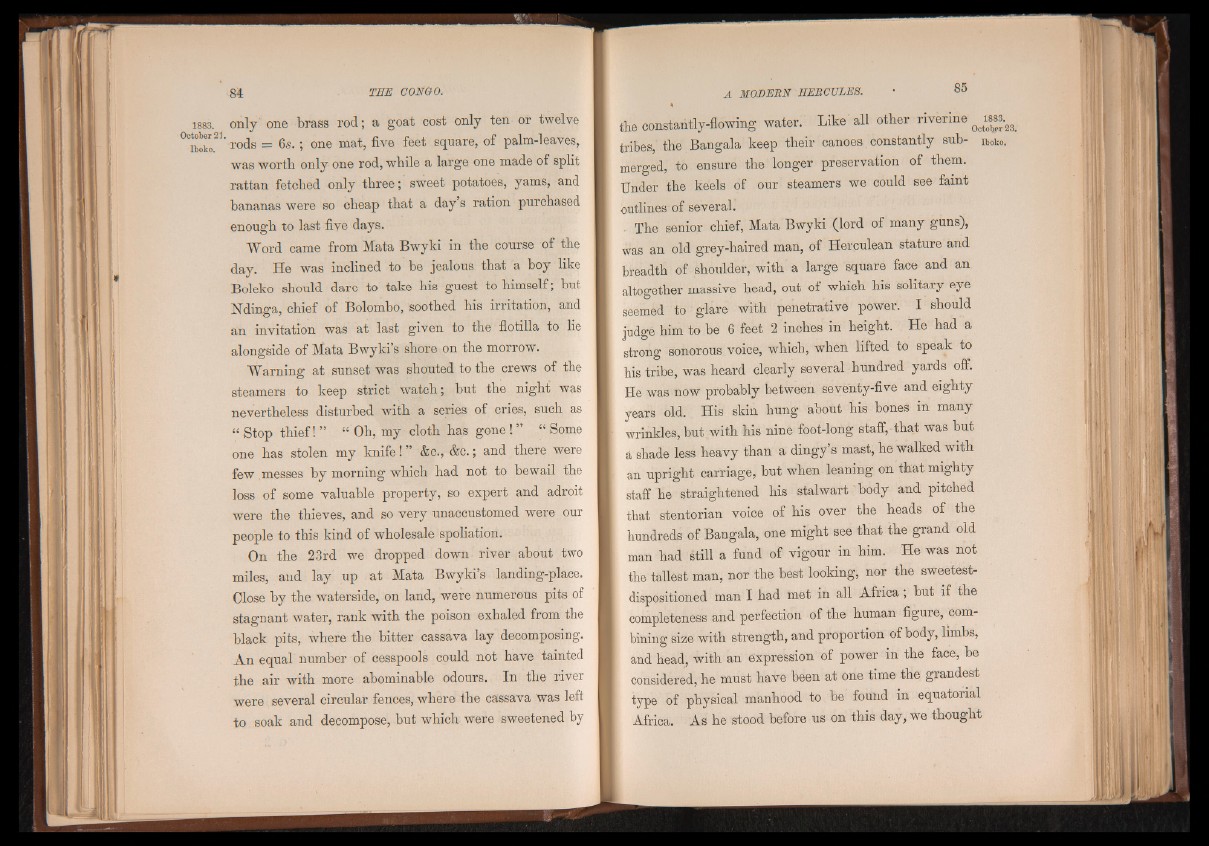
84 THE GONGO.
1883. only' one brass rod; a goat cost only ten or twelve
“ I21' rods = 65.; one mat, five feet square, of palm-leaves,
was worth only one rod, while a large one made of split
rattan fetched only thre e; sweet potatoes, yams, and
bananas were so cheap that a day s ration purchased
enough to last five days.
Word came from Mata Bwyki in the course of the
day. He was inclined to be jealous that a hoy like
Boleko should dare to take his guest to himself; but
Ndinga, chief of Bolombo, soothed his irritation, and
an invitation was at last given to the flotilla to lie
alongside of Mata Bwyki’s shore on the morrow.
Warning at sunset was shouted to the crews of the
steamers to keep strict watch; hut the night was
nevertheless disturbed with a series of cries, such as
“ Stop thief! ” “ Oh, my cloth has gone ! ” “ Some
one has stolen my knife! ” &c., &c.; and there were
few messes by morning which had not to bewail the
loss of some valuable property, so expert and adroit
were the thieves, and so very unaccustomed were our
people to this kind of wholesale spoliation.
On the 23rd we dropped down river about two
miles, and lay up at Mata Bwyki’s landing-place.
Close by the waterside, on land, were numerous pits of
stagnant water, rank with the poison exhaled from the
black pits, where the bitter cassava lay decomposing.
An equal number of cesspools could not have tainted
the air with more abominable odours. In the river
were several circular fences, where the cassava was left
to soak and decompose, but which were sweetened by
A MODERN HERCULES. ' 85
the constantly-flowing water. Like all other nverme
tribes, the Bangala keep their canoes constantly sub- itoto.
merged, to ensure the longer preservation of them.
Under the keels of our steamers we could see faint
outlines of several.
The senior chief, Mata Bwyki (lord of many guns),
was an old grey-haired man, of Herculean stature and
breadth of shoulder, with a large square face and an
altogether massive head, out of which his solitary eye
seemed to glare with penetrative power. I should
judge him to be 6 feet 2 inches in height. He had a
strong sonorous voice, which, when lifted to speak to
his tribe, was heard clearly several hundred yards off.
He was now probably between seventy-five and eighty
years old. His skin hung about his bones in many
wrinkles, but with his nine foot-long staff, that was but
a shade less heavy than a dingy’s mast, he walked with
an upright carriage, but when leaning on that mighty
staff he straightened his stalwart body and pitched
that stentorian voice of his over the heads of the
hundreds of Bangala, one might see that the grand old
man had still a fund of vigour in him. He was not
the tallest man, nor the best looking, nor the sweetest-
dispositioned man I had met in all Africa; but if the
completeness and perfection of the human figure, com
bining size with strength, and proportion of body, limbs,
and head, with an expression of power in the face, be
considered, he must have been at one time the grandest
type of physical manhood to be found in equatorial
Africa. As he stood before us on this day, we thought